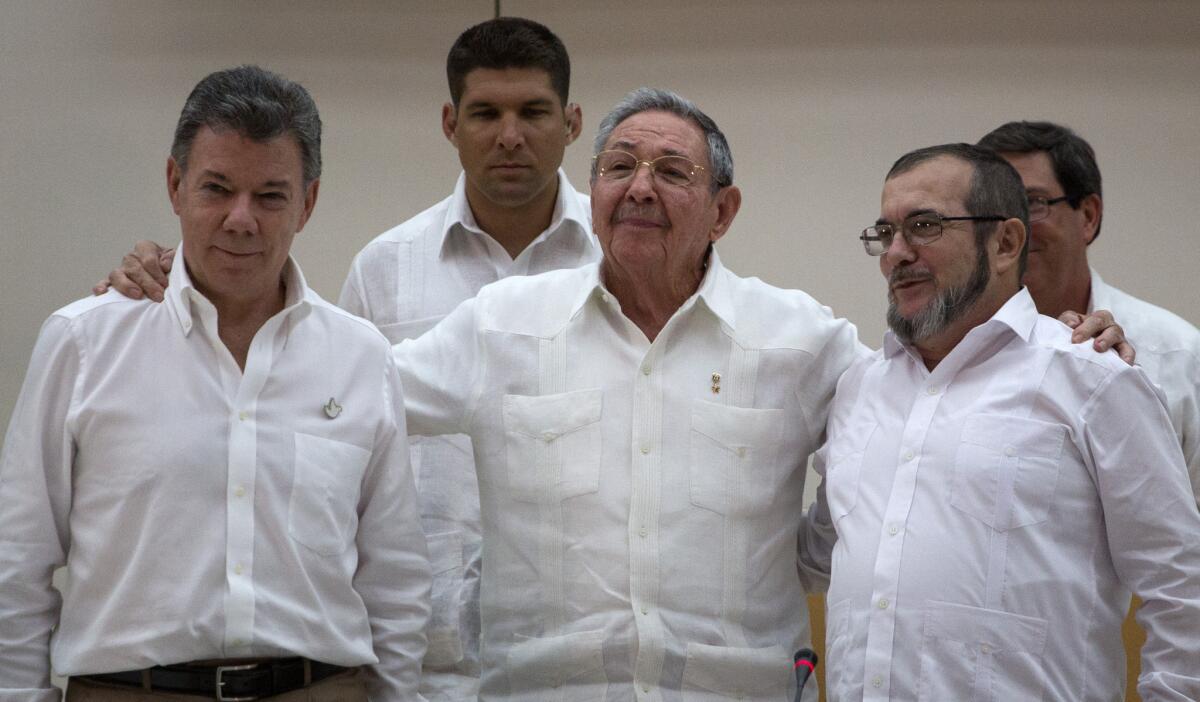Colombia, FARC rebels announce accord to end 5-decade war

- Share via
Reporting from BOGOTA — Colombia’s government and largest rebel group announced Wednesday that they have reached a comprehensive agreement for ending the hemisphere’s longest-running conflict.
The peace accord between the government of President Juan Manuel Santos and the Revolutionary Armed Forces of Colombia, or FARC, must first be approved by voters in a nationwide plebiscite that could take place as soon as next month.
But the announcement of a deal after nearly four years of negotiation is the closest Colombia has come to ending a war that started in 1964. Internecine violence has claimed 220,000 lives, driven 6 million people from their rural homes into cities and stunted the economy of a country rich in resources and human capital.
“We have won the most beautiful of battles, that of peace for Colombia,” rebel negotiator Ivan Marquez told reporters in Havana, where the talks took place. “With this agreement, we can proclaim the end of war with arms and the start of the contest of ideas.”
The White House said that President Obama called Santos to congratulate him, saying he “recognized this historic day as a critical juncture in what will be a long process to fully implement a just and lasting peace agreement that can advance security and prosperity for the Colombian people.”
The deal requires rebels to leave their hide-outs in the mountains and jungles, give up their weapons and move to 23 “relocation zones” and eight existing rebel camps.
The deal also guarantees extensive aid to demobilized guerrillas and the formation of a truth commission that grants amnesty to rebels and government soldiers who confess to drug running, terrorism, extrajudicial killings and other crimes.
Under the agreement, the FARC would be given five seats in both the Senate and the House of Representatives for the next two sessions of Congress, the government said in a statement Wednesday. At that point, its political party must compete for seats like any other.
Political representation for the FARC was one of the final stumbling blocks in the talks that began in November 2012 and nearly collapsed on several occasions, including in 2014 when the rebels kidnapped a Colombian army general.
Santos, who made a peace deal a primary goal of his administration, initially promised that the talks would take “months, not years.” As negotiations dragged on, his approval ratings plunged and now fall shy of 30%.
Approval of the agreement is not a sure thing, with polls reflecting sharply divided public opinion, especially over provisions that will shield rebels from harsh prison sentences.
Opposition to the accord has been led by former President Alvaro Uribe, now a senator and a fierce critic of Santos. Another senator, Alfredo Rangel, told a television reporter Wednesday that the agreement guarantees not peace but “impunity for perpetrators of crimes against humanity.”
Colombia-watchers, though, hailed the agreement as a milestone.
“Following more than 50 years of conflict and suffering which has scarred nearly every family in Colombia, peace is no longer a fantasy,” said U.S. Rep. Jim McGovern (D-Mass.).
“This is a necessary condition for Colombia to eradicate violence and move toward modernity,” said Adam Isacson, an analyst at the think tank Washington Office on Latin America. “You have to have this accord before the government can take on its many problems.”
Human rights activist John Lindsay-Poland of American Friends Service Committee called the accord a “cause for celebration despite its flaws and the challenges that face its ratification and implementation.”
He lamented that the deal gives “impunity” to members of the Colombian armed forces implicated in the decade-old “false positives” scandal. Soldiers killed up to 5,000 innocent civilians and claimed they were rebels in an attempt to gain promotions and other military benefits.
Apart from whether voters will approve the agreement, another question is how its implementation would be financed. Vocational training for former rebels, agrarian reform, road construction and other programs included in the deal would cost between $40 billion and $75 billion over the next decade.
The United States has pledged to help. Since 2000, it has given Colombia more than $10 billion in anti-drug, anti-terror and military aid.
Implementation of the agreement wouldn’t mean an end to all guerrilla warfare in Colombia. The government continues to battle another leftist insurgent group, the National Liberation Army, which has refused to give up kidnapping — a condition the government says must be met before it would enter peace talks.
Kraul is a special correspondent.
ALSO
Syrian rebels backed by Turkey and U.S. claim major victory over Islamic State
Biden seeks Turkey’s patience as U.S. decides whether to extradite cleric sought in coup attempt
As women are fined for wearing head scarves, French activists push back on ‘burkini’ ban
UPDATES:
7:30 p.m.: This article was updated with staff reporting.
This article was originally published at 4:40 p.m.
More to Read
Sign up for Essential California
The most important California stories and recommendations in your inbox every morning.
You may occasionally receive promotional content from the Los Angeles Times.










